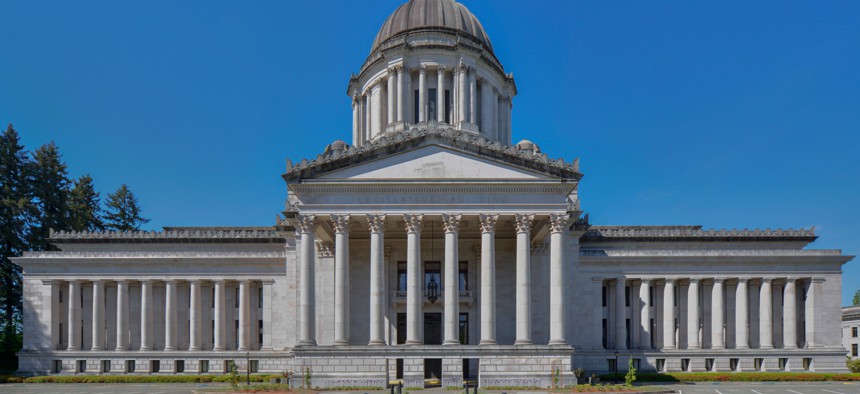Democratic Governors: States Lead on Economy Equality and Climate Change

The Washington State Capitol in Olympia. Shutterstock

Connecting state and local government leaders
“Donald Trump cannot stop us in states and governors in building a clean energy future,” Washington Gov. Jay Inslee said during the Center for American Progress 2018 Ideas Conference.
WASHINGTON — Democratic governors argued Tuesday that states have never mattered more, where closing the skills gap in the U.S. labor force and capturing the clean energy economy are concerned.
Speaking at the Center for American Progress 2018 Ideas Conference in the nation’s capital, New Jersey Gov. Phil Murphy outlined his plans for growing the state’s middle class after Republican Gov. Chris Christie’s exit from Trenton.
Murphy said he wants to dramatically expand startup incubators, open the largest offshore wind farm in the world, connect communities with modern mass transit—“something that we had given up on, quite frankly”—and expand access to early childhood and postsecondary education.
“As our national politics is increasingly defined by its fits and starts, it will again be up to states to lead,” Murphy said. “I reject completely President Trump’s thinking that for one person to do well, another must be left behind. The ‘zero-sum society’ may be his, but it is not ours and it is not America’s.”
In his March budget proposal, Murphy’s administration included investments paving the way for universal pre-kindergarten and tuition-free community college for every New Jersey resident. The state could become the first to approve both.
Half the jobs created in New Jersey by 2024 will be middle-skill jobs, Murphy said, but the state will only have one-fourth of the properly trained workers needed to fill those positions.
Nowhere is the jobs message better than the clean energy industry, which is growing at twice the rate of the rest of the economy and 17 times as fast in the case of solar, said Washington Gov. Jay Inslee.
“It’s governors who are leading, and here’s the central message: Donald Trump cannot stop us in states and governors in building a clean energy future,” Inslee said.
Within 48 hours of Trump pulling the U.S. out of the Paris Agreement, 15 states stood up the U.S. Climate Alliance.
States like California have seen success with their cap-and-trade programs programs curbing emissions when there’s an environmental justice component to them, because the air quality effects of climate change disproportionately impact African American and Latino communities, said liberal activist and philanthropist Tom Steyer.
Similarly, support for a 35-acre solar farm in Spartanburg, South Carolina stemmed from a broader effort to revitalize vulnerable communities.
“These conversations, if you want them to resonate with folks, then there has to be: How we are lowering public health impacts?” said Mustafa Ali, former Environmental Protection Agency justice administrator. “But also, how we are creating economic opportunities for those who have often been forgotten?”
In that vein, Inslee’s administration wants to establish a fund to help all residents affordably install solar panels at home.
“I believe the clean energy revolution, the climate change fight, has to be fought in parallel with the fight for a more equal economy,” Inslee said. “And both of those have to be victorious at the same time.”
Dave Nyczepir is a News Editor at Government Executive’s Route Fifty and is based in Washington, D.C.

NEXT STORY: Ann Arbor Puts a Cork in Public Tree Tapping





